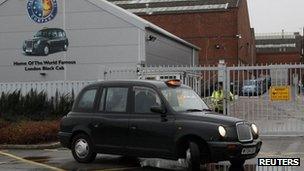Coventry produces rival taxis for London market
- Published
.jpg)
The Mercedes-Benz Vito taxi has been seen as a threat to the traditional cabs made by LTI
Black taxi cabs roaming the streets of London are changing their shapes, their brands, their type of manufacture.
The competition for a market worth a reported £50m a year is hotting up and Coventry, a city steeped in motor heritage, is still producing the majority of the vehicles.
The future of the LTI company responsible for the traditional vehicles is uncertain at a time when a viable alternative that can be flagged down on the side of London's roads has already been established and is enjoying a growth in sales.
Since 2008, Eco City Vehicles has sent hundreds of Mercedes-Benz Vito vans to be modified at a factory, run by Penso, less than five miles - or a cab fare of about £11 - from the home of LTI and its current TX4 model.
The chief executive of Eco City Vehicles, Peter DaCosta, said the decision to use Penso, based near Coventry Airport, was an easy one.
Mr DaCosta said: "I know the motor trade has gone through some horrendous years but I always felt the West Midlands and Coventry had the best engineers. They understood the taxi."

Jobs were lost at LTI after the firm's parent company Manganese Bronze called in administrators
Administrators called in
Some 331 Vito taxis were sold in 2011.
In the first half of this year alone 324 were produced representing a 38% share of the new vehicle market in London, according to a company report.
Mr DaCosta is confident that half of the total cabs in London will eventually be of this model.
While momentum has been gathering for the six-seater Vito, production of the distinctive LTI taxi hit the buffers in October when owners Manganese Bronze called in administrators PricewaterhouseCoopers.
A fault with the TX4's steering box led to about 400 of them being recalled which impacted on cash flow. The company's shares were also suspended.
The fault has since been fixed and the cabs are back on the road.
But not before more than 150 workers were made redundant, many at the Holyhead Road plant in Coventry, and PwC is currently in the process of finding new owners.
One of the joint administrators for PwC, Matthew Hammond, said: "Although it's too early to say definitively, we are hopeful that we will sell the business as a going concern
"The ongoing support of the group's management team, employees and unions has been unwavering and very welcome."
Mr Hammond added that the company still had work until at least late February because "over 600 largely new and unregistered vehicles" still needed the new steering system fitted.
Peter Coulson, a spokesman for the Unite union, said he was fighting hard to keep LTI in the UK because he "didn't want to see another British icon leave these shores".
He added that the long wait for a resolution to the case of the ailing firm, which has Chinese shareholders, was an advantage to Mercedes-Benz in the battle for market share in London.
But Mr Coulson admitted competitive forces would determine future success, not least with Nissan understood to be eyeing up a piece of the action.
'Archaic regulations'
The threat of a modern day competitor for fares in the capital has been on the cards for some time, according to a motor industry expert.
Prof Garel Rhys, of the Centre for Automotive Industry Research at Cardiff University, said the LTI product had been protected for too long by the lack of what he called "free market entry".
He said until now there were few vehicles that could meet the "archaic" regulations in London which include a 28 ft (8.5 m) turning circle.

Who will gain the lion's share of the London market in the future?
Prof Rhys said: "Occasionally people have tried to penetrate the market, most notably Metrocab about 20 years ago, but there hasn't been too much success.
"LTI hasn't developed as it should and is still based on the same model since the 1960s.
"If it hadn't been for Metrocab they wouldn't have five seats in them now."
He added that the timing of the problems in a new design for the steering box, sourced from an unnamed new supplier introduced by Chinese partner Geely, "could not have been worse with the growth in sales of the Vito".
"The Vito has shown that it could compete. It is a serious threat to LTI, the first in the post-war period," said Prof Rhys.
And Mr DaCosta said if it had not been them, another company would have come along at some point to mount a big challenge in a market that has 25,000 vehicles.
"The LTI vehicle, as much as I've grown up with it, something needed to be done. The opportunity came along and we took it," he said.
"Our market share was creeping before LTI hit this problem. I want to build the brand and I want to build the brand globally because I feel the vehicle has done its apprenticeship."
- Published15 December 2012
- Published15 November 2012
- Published1 November 2012
- Published22 October 2012
- Published12 October 2012